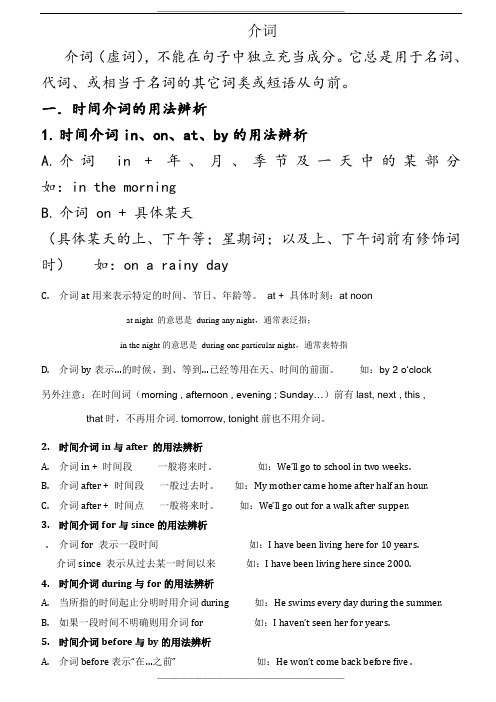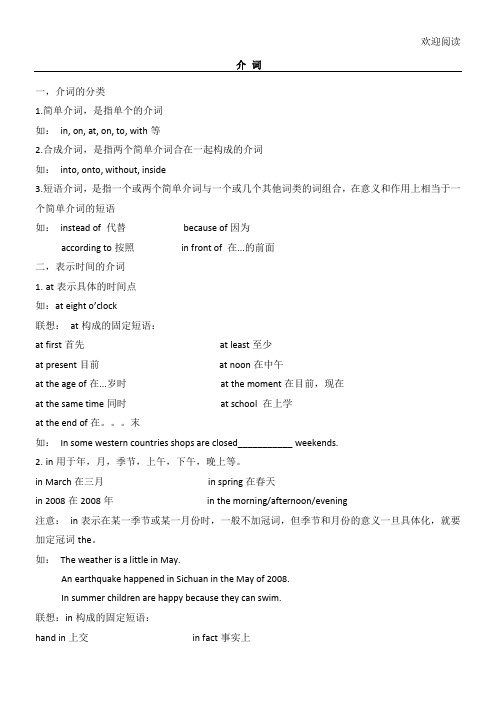初一升初二第六讲介词讲义9
- 格式:doc
- 大小:40.00 KB
- 文档页数:4

成都百分师资教育初一升初二英语讲义————介词介词的用法一种虚词。
不能单独作句子成分,它只有跟它后面的宾语一起构成介词短语,才能在句子中起作用。
有:in, on, under, with, behind, about, near, before, after, for, to, up, down, from, in front of, out of, from…to…, at the back of…中考介词主要考查要点如下:1、介词与其后的名词或代词构成介词短语,在句中作状语、宾语、表语、宾补语后置定语。
2、介词与其前面的动词或形容词构成动词词组,后面要有宾语。
这时的词组相当于一个及物动词。
e.g: play with, be afraid of…。
3、表示时间的介词有:at, on, in。
(1)at表示“在某一个具体的时间点上”,或用在固定词组中。
如:at ten o’clock, at 9:30 a.m., at night, at the weekend…(2)on表示“在某日或某日的时间段”。
如:on Friday, on the first of October, on Monday morning…(3)in表示“在某一段时间(月份、季节)里”。
如:in the afternoon, in September, in summer, in 2005…4、in一词还有其他的固定搭配,如:in blue(穿着蓝色的衣服),in English(用英语表达),take part in(参加)。
5、in, to, on表示方位:in表示在某一地区之内的方位(属于该范围)。
On表示与某一地区的毗邻关系。
to表示在某一地区之外的某一方位(不属于该范围)他们所表示的位置关系恰似数学中圆的“包含(in)、相离(to)、相切(on)”关系。
如:Taiwan is in the southeast of China. 台湾位于中国东南部。


介词介词(虚词),不能在句子中独立充当成分。
它总是用于名词、代词、或相当于名词的其它词类或短语从句前。
一.时间介词的用法辨析1. 时间介词in、on、at、by的用法辨析A. 介词in + 年、月、季节及一天中的某部分如:in the morningB. 介词 on + 具体某天(具体某天的上、下午等;星期词;以及上、下午词前有修饰词时)如:on a rainy dayC. 介词at用来表示特定的时间、节日、年龄等。
at + 具体时刻:at noonat night 的意思是during any night,通常表泛指;in the night的意思是during one particular night,通常表特指D. 介词by表示…的时候、到、等到…已经等用在天、时间的前面。
如:by 2 o‘clo ck另外注意:在时间词(morning , afternoon , evening ; Sunday…)前有last, next , this , that时,不再用介词. tomorrow, tonight前也不用介词。
2. 时间介词in与after 的用法辨析A. 介词in + 时间段一般将来时。
如:We’ll go to school in two weeks.B. 介词after + 时间段一般过去时。
如:My mother came home after half an hour.C. 介词after + 时间点一般将来时。
如:We’ll go out for a walk after supper.3. 时间介词for与since的用法辨析. 介词for 表示一段时间如:I have been living here for 10 years.介词since 表示从过去某一时间以来如:I have been living here since 2000.4. 时间介词during与for的用法辨析A. 当所指的时间起止分明时用介词during 如:He swims every day during the summer.B. 如果一段时间不明确则用介词for 如:I haven’t seen her for years.5. 时间介词before与by的用法辨析A. 介词before表示“在…之前”如:He won’t come back before five .B. 介词by表示“到…时为止,不迟于…”如:The work must be finished by Friday.6. 时间介词till与until用法的异同A. till和until用在肯定句中,均可表示“直到…为止”,如:I will wait till(until)seven o'clock.B. till和until用在否定句中,均可表示“在…以前”或“直到…才”。

欢迎阅读介词一,介词的分类1.简单介词,是指单个的介词如:in, on, at, on, to, with等2.合成介词,是指两个简单介词合在一起构成的介词如:into, onto, without, inside3.短语介词,是指一个或两个简单介词与一个或几个其他词类的词组合,在意义和作用上相当于一个简单介词的短语如:instead of 代替because of因为according to按照in front of 在...的前面二,表示时间的介词1.at表示具体的时间点如:at eight o’clock联想:at构成的固定短语:at first首先at least至少at present目前at noon在中午at the age of在...岁时at the moment在目前,现在at the same time同时at school 在上学at the end of在。
末如:In some western countries shops are closed___________ weekends.2.in用于年,月,季节,上午,下午,晚上等。
in March在三月in spring在春天in 2008在2008年in the morning/afternoon/evening注意:in表示在某一季节或某一月份时,一般不加冠词,但季节和月份的意义一旦具体化,就要加定冠词the。
如:The weather is a little in May.An earthquake happened in Sichuan in the May of 2008.In summer children are happy because they can swim.联想:in构成的固定短语:hand in上交in fact事实上in surprise吃惊地in search of寻找in public当众in the end最后,终于in no time立刻,马上in a minute立刻,马上in front of在...前面in a word一句话,总而言之in good health身体健康的do well in在...方面干的不错be interested in对...感兴趣in common共同的show great interest in对。

介解一.介的概念:介用来表明名与句中其他的关系,不能独使用。
介的作用above, around, at, behind, between, by,表地点、位置、方向的介down, from, in, up, in front of, into, onto, near, off, out, over, through, under,介towards,表的介by, in, on ,over, with其他介like, with, without, from, next, to二、常用介的解1、in 在......之内1)表示地点,表示大地点。
She’ s in China with her mom and dad.2)表示,表示在某一个段内。
The weather is cold in winter.3)表示色和言也用介 in。
Doyou know the girl in red?I can write this article in English.2、from从......中来1) come from 来自I come from China and I’m Chinese.2)from ⋯.to⋯从⋯.到⋯..It’s not from my home to scholl3.with 和,用,与1)with sb 和......人在一起I ’m in Class One with Daming and Lingling.2)with sth.表示用某种工具I write with my pen, and I see with my eyes.4.at 在 ......1)表示地点,主要指小地点。
My father is a teacher at Beijing International School.2)表示时间,主要指时间的一个点。
I get up at half past seven in the morning.3) be good at擅长于......I am good at reading and writing.5.behind 在......后面The classrooms are behind the offices.6. next to紧挨着The library is next to the classrooms.7. in front of在......前面They are in front of Tony and Daming.8. for为了......,因为。

(内部资料) 2018.1目录第一讲名词第二讲冠词第三讲代词第四讲数词第五讲介词第六讲形容词和副词第七讲连词第八讲情态动词第九讲非谓语动词第十讲时态第十一讲被动语态第十二讲祈使句、倒装句、反意疑问句和感叹句第十三讲宾语从句第十四讲定语从句第十五讲状语从句第十六讲主谓一致第十七讲情景交际第十八讲词义辨析附录I 重点短语概 述一、概述语法是研究词形变化和句子结构的科学,研究词形变化的部分成为词法(名词的数、格,动词的时态、语态), 研究句子结构的部分称为句法(句子成分、语序,句子种类)。
二、英语词类三、句子成分句子中有两个最重要最基本的成分,主语和谓语。
除了主语和谓语,句子有时还有其他成分,宾语、定语、状语、表语等。
主语:一般位于句首,说明所要讲述的对象或主体,表示要说的“谁”或“什么”,一般由名词、代词或 名词性的词类、短语或从句充当。
We often practise speaking English after class.Your father’s car is new.Watching English films is a good way to learn English.谓语:位于主语之后,说明主语的情况(动作或状态)---“做什么”“是什么”“怎么样”。
必须为动词或动词短语充当, 或由系动词加形容词、名词充当。
谓语与主语要保持人称和数一致。
I saw your brother yesterday.Tom will arrive in 10 minutes.She feels weak after a long illness.表语:位于系动词后,说明主语“是什么”“怎么样”,一般由形容词、名词充当。
构成主系表结构。
She is a teacher.The girl looks healthy.The cake tastes good.宾语:位于及物动词之后,说明动作、行为的对象或结果。
介词及介词短语【考点直】1.常用介及其的主要用法及意2.介表示、方位、方式的基本用法3.一些易混介的辨析【法解】◆介词的功能介是一种虚,用来表示名或相当于名的其它句中其它的关系,不能独使用。
介可与名或相当于名的其它构成介短。
介短可在句中作定,状,表和足。
例如:The boy The girl overwilltherebeisbackJohn’sin twobrother.hours.(定)(状)◆介词和种类(1)介,常用的有at,in,on,about,across,before,beside,for, to,without等。
(2)复合介,如 by means of, along with,because of, in frontof, insteadof 等。
◆不同介词的用法( 1)表的介1) at,in on表示点用 at 。
例如: at six o’clock,at noon,at midnight 。
表示在某个世,某年,某月,某个季以及早晨,上午,下午,晚上,用in 。
例如:in the nineteenth century,in2002,in may, in winter,in the morning,in the afternoon 等。
表示具体的某一天和某一天的上午,下午,晚上,用on。
例如: on Monday,on July1st,on Sunday morning 等。
2) since,after由 since和 after引的都可表示从去某一点开始的段,但since表示的段一直延到的刻,因而往往要与在完成用。
而after 所表示的段系去,因而要与一般去用。
例如:I haven’t heard from him since last summer.After five days the boy came back.3)in,afterin 与将来用,表示“ 多以后”的意思,后面跟表示一段的。
第六讲:介词课前演练1. About ________ students in our class can describe that place in English.A. three-fifthsB. three-fifthC. third-fiveD. third-fifths2. Nine _______ pounds a week? That’s very good.A. hundredsB. hundredC. hundred ofD. hundreds of3. We often have sports after class, and I like to play _______ basketball.A. aB. anC. theD. 不填4.This is _______ song I’ve told you about. Isn’t it _______ beautiful one?A. the; theB. a; aC. the; aD. a; the5. This morning I had ________ egg and a bottle of milk for my breakfast.A. anB. aC. theD./6. ---What’s the matter with you?---I caught ________ bad cold and had to stay in ________.A. a;/B. a; theC. a; aD. the; the7. ---Have you seen _______ pen? I left it here this morning.---Is it ________ black one? I think I saw it somewhere.A. a; theB. the; theC. the; aD. a; a8. About _______of the books in our school library are written in Chinese.A. fouth-fifthsB. four – fifthC. four –fifthsD.fourths-fifth9.The road is over_______meters long.A. six hundred and fifty-twoB. six hundreds and fifty twoC. six hundred, fifty –twoD. six hundred, fifty and two10. January_____is New Year’s Day.A. oneB. twoC. the firstD. the second11. I think that the______century (世纪) will bring us more hopes.A. twenty-oneB. twentieth-firstC. twenty-firstD. twentieth-one12. -- How many students are there in your school?--_____the students in our school______over two thousand.A. The number of ; isB. The number of ; areC. A number of ; isD. A number of ; are考点链接一、用适当的介词填空By, about ,on, from, to, in, with, for, at, in, by, without, of1. Can I ask you some questions _____ Maths homework?2. She travels ______ herself.3. She is mean ______ her children.4. _____ my way _____ school , I meet an old man.5. Fish can't live ______ water .6. Simon is going to China _____ his holiday .7. My birthday party is _____ Saturday evening .8. It happens _____ June 7th.9. She is running ____ a cat.10. She is a girl _________ Japan.11. She tells me a story ______ my birthday .12. What are you wearing ________ that red skirt ?13. I'm making a card _________ my mum.14. Dick puts his vegetables out _______ display .15. They are talking ________ the telephone .16. I buy some bread _________ my breakfast .17. I'm talking _________ to you .18. Can I speak ________ Grandpa ?19. We keep _______ touch _______ my parents .20. They want to fight ________ country .21. They are getting ready ______ the lesson .22. Do you prepare _______ the test?23. I'm making a card _________ my mum.24. We are watching a film ______ TV二、选择题1 Children get gifts ____ Christmas and ____ their birthdays.A. on; onB. at; onC. in; inD. in; on2 -There is nothing tomorrow afternoon, is there?-No. We can have a game of table tennis.A. onB. inC. outD. up3 A lot of students in our school were born ____ March, 1981.A. inB. atC. onD. since4 We returned to our hometown___.A. next weekB. in the last weekC. last weekD. for a week5 Children wake up very early ____ the morning of Christmas Day.A. inB. onC. forD. at6____ a cold winter morning, I met her in the street.A. InB. OnC. AtD. For7 The doctor worked___ five hours___ a rest.A. for; withB. on; withoutC. about; havingD. for; without8 I worked on the problem ____ a long time and I worked it out____ myself____ last.A. for; by; atB. in; with; onC. on; by; inD. for; for; at the9 A new factory will be set up___ a years later.A. forB. inC. afterD. on10 She lived in the mountain village____ the years 1940-1950.A. betweenB. duringC. inD. since11 Miss Wang will come to Beijing____ two days.A. afterB. inC. onD. before12 They are getting ready____ fly____ England____their holiday.A. for; to; toB. to; to; forC. for; for; toD. to; to; to13 What did you have ___ breakfast?A. atB. asC. forD. about易考易混点1.The beautiful bottle was made ____ glass.A. fromB. inC. ofD. by2.They are getting ready____ fly____ England____their holiday.A. for; to; toB. to; to; forC. for; for; toD. to; to; to3.-His sudden death surprised his wife.-It was so bad. His wife was surprised ____ his death.A. byB. withC. atD. on4.Don't laugh____ him, he only made a small mistake.A. atB. toC. aboutD. over5. ___ the money, she bought a new coat ___ her father.A. With; forB. With; toC. For; withD. To; with6.Wei Hua gets on well ___ her classmates.A. withB. inC. toD. at7.On my way _______ home. The right way _______ ride a bike. The way ______ Nanning.A to, to, forB to, for toC /, to, toD to, to, to8. He drove away___ the direction of London.A. inB. atC. toD. for9. The letter was written ___ ink.A. withB. inC. byD. at10.The police station is ___ the clothing shop ___ the post office.A. between; andB. among; andC. near; ofD. on; right11.When a piece of ice is taken ____ a warm room, it gets smaller and smaller until ___ the end itdisappears completely.A. in; inB. out of; atC. into; inD. to; by12 They are waiting ___ a bus ___ the bus stop.A. for; inB. on; atC. with; atD. for; at中考演练1.Some volunteers from Beijing arrived in Shanghai_____ April 29 to work for the WorldExpo.A onB atC ofD to2. –What tim do you expect me back, Mum?--______half an hour.A AtB BeforeC In DFor3. The way we learn English is quite different______ that we learn math.A fromB offC betweenD with4. He often borrows things_______ others, but he doesn’t lend anything_____ anybody.A to; fromB from; toC from; for5. I didn’t go to bed_______ my mother came back late last night.A soB untilC though6. ---All the clerks went home_____ Mr Wang. Why?---Because he had to finish his work.A exceptB besidesC withoutD beside7. The policeman helped the old woman______ the road.A aboveB acrossC throughD over8. You can improve your English_____ reading more.A inB withC byD of。